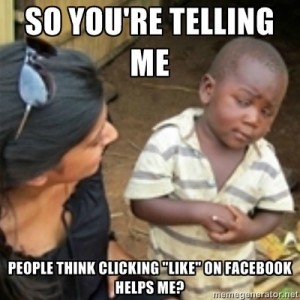The Internet is a playground for thousands of campaigns across the world. There are campaigns on nearly every possible issue imaginable – from the environment to human rights, corruption to climate change – and the advocates within these communities do everything from raising awareness, signing online petitions, and fund raising. In other words, they are trying “to change the world.”
However, despite the fact that they are offering massive visibility to issues that require urgent attention globally (as well as bringing together people to take a specific action to put pressure on the political agenda), some of these campaigns lack contextualization to the issues they manage. Sometimes even excluding the main actors involved in the problem. Besides this, “online activism” tends to westernize global social issues, and even over simplifies complex social problems with the logic of consumerism that cannot apply to social contexts in other parts of the globe.
The rise of “clicktivism”
A few months ago, we posted about influencing change in a social world and how people can leverage their influence online to make causes a success. But is it really that simple? Or is there more to it?
 Micah White is one of the many authors who has leanings against online activism or “clicktivism.” In his words : “Clicktivists dilute their messages for mass appeal and make calls to action that are easy, insignificant and impotent. Their sole campaign objective is to inflate participation percentages, not to overthrow the status quo. In the end, social change is marketed like a brand of toilet paper.”
Micah White is one of the many authors who has leanings against online activism or “clicktivism.” In his words : “Clicktivists dilute their messages for mass appeal and make calls to action that are easy, insignificant and impotent. Their sole campaign objective is to inflate participation percentages, not to overthrow the status quo. In the end, social change is marketed like a brand of toilet paper.”
White argues that one problem of online activism is the obsession with metrics and numbers to demonstrate results and impact. It is the adaptation of the logic of advertising to activism.
“To increase click rate, they water down their messages and make their “asks” easier and “actions” simpler. Soon, the “click to sign” deception is rolled out and simply opening an email link is treated as signing a petition. And yet, while their membership list grows larger, the active portion of their base disappears. And what is worse, as well-meaning digital activists soon discover, they are being outdone by disingenuous advertising campaigns posing as true agents of change.”
Yes, many of these campaigns succeed in providing global visibility to truly important issues requiring urgent action (and a good number succeed in putting pressure and getting concrete results). But there can often be a lack of context to the issues. This can reduce the complexity of the situation and exclude the local efforts of the main actors (NGOs, Government, civil initiatives).
Westernized campaigning
A famous example is the Kony video, which called for the arrest of Joseph Kony (who recruited child soldiers in Uganda). It featured high quality production, pop marketing campaigning, a simplified message, and offered a quick solution to the problem: by "sharing this video" people can put pressure on the US government to capture Kony. Perhaps it was because of this that the “documentary” now has more than 76 million views, was the first nearly 30-minute video to go viral online, and, in only 2 days after its launch, reached a record 90k+ views.
.
However, critics say the video distorts facts and reinforces Western stereotypes; many people across the world, especially Ugandans, reacted negatively to the campaign. And this is because Kony, and a good number of other campaigns “promote paternalistic, charity-driven identities and roles for Northern donors and suggest that the agency of people in the South is not important, thereby failing to challenge the representation of Southern ‘others’ as helpless victims.” (Taken from: Development Made Sexy: how it happened and what it means (2008), written by John Cameron and Anna Haanstra).
Should charities ditch online campaigns? Absolutely not!
 If we’ve learned one thing about social media in the last few years, it’s that there is power in numbers. People online can have (and have had) an impact on the social issues they have chosen to partake in.
If we’ve learned one thing about social media in the last few years, it’s that there is power in numbers. People online can have (and have had) an impact on the social issues they have chosen to partake in.
Just take a look at the Arab Spring (where information was disseminated via blogs, Twitter, and Facebook Groups) or Oscar Morales’ “One Million Voices Against FARC” (which took advantage of Facebook to organize the biggest protest against this illegal arm group -see photo-, and thus created a Foundation that fights for human rights in Colombia).
The web offers an incredible potential to bring people together to discuss topics that are relevant in the current global political agenda. We – the people with easy access to the Internet – are more connected than ever. This gives rise to opportunities for debates, innovation, and rapid change (and it can all be done more efficiently than before). But this opportunity also represents a huge responsibility to take a more critical attitude towards what is being shared online and to define what our roles are as participants in this playground.
Like never before, we have the tools to involve experts (local and global), the academe, public institutions, and other actors to be part of the discussion and offer a complete contextualization of the issues. In every social (humanitarian or otherwise) campaign that one commits to, it is crucial to really work on helping online supporters and their actions transcend into real transformers of social change – from the ground up.
How would you like to change the world? A number of people from ZN are working with The Synergist to turn inspiring ideas into tangible projects that make a world of a difference.
.











